JSTOR Digital Stewardship Services
Meet the integrated, cloud-hosted solution that helps you confidently scale digital stewardship efforts while ensuring your collections are preserved, and discoverable, for the future.
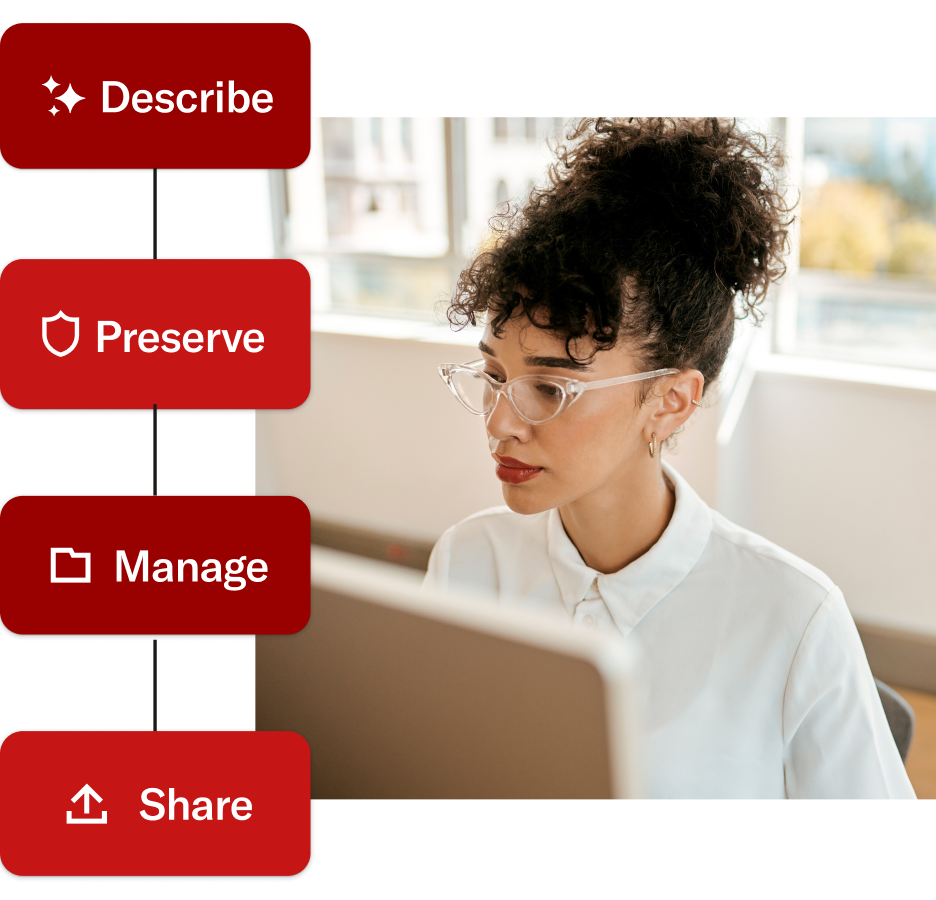
Community voices
Solve common collections management challenges like never before
Developed by a mission-driven nonprofit in collaboration with librarians and archivists, these services integrate digital asset management, AI-powered collection processing support, long-term preservation, and paths for increased discovery.
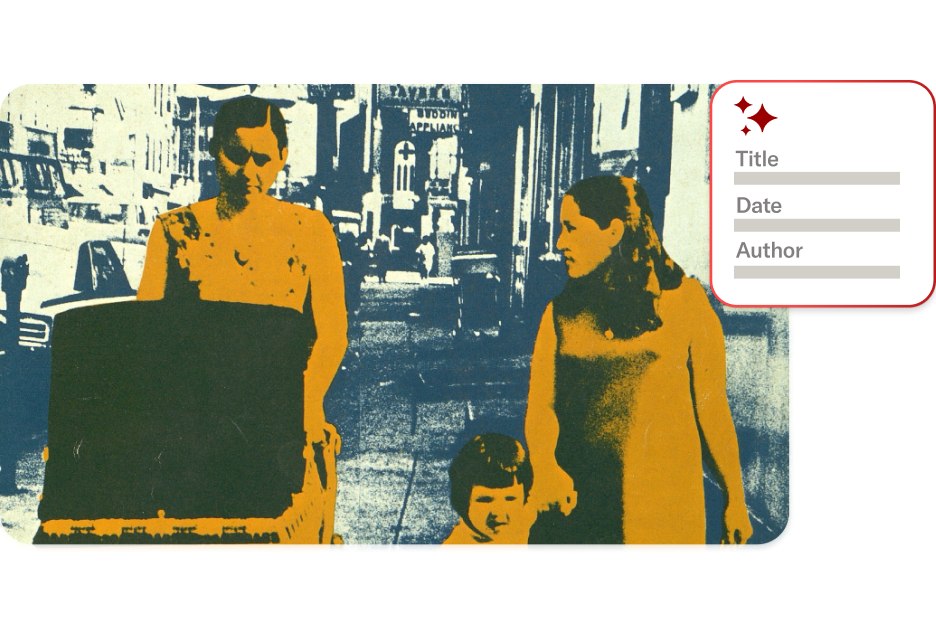
AI-assisted collections processing
JSTOR Seeklight accelerates the creation of descriptive metadata, and the generation of collection-level insights, while ensuring expert oversight and institutional control.
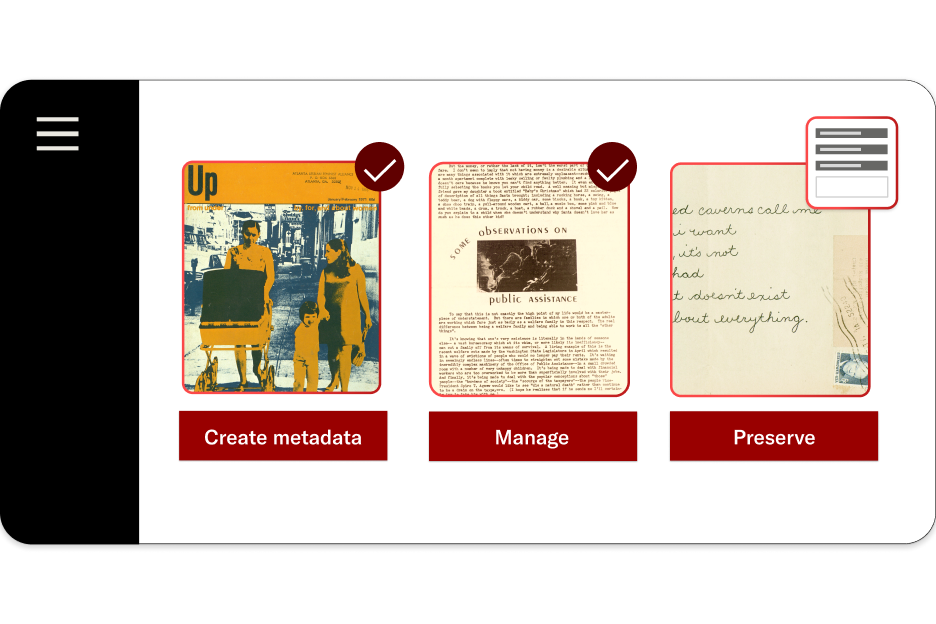
One unified, cloud-hosted solution
Combine tools for digital asset management, descriptive metadata creation, long-term preservation, and seamless sharing.
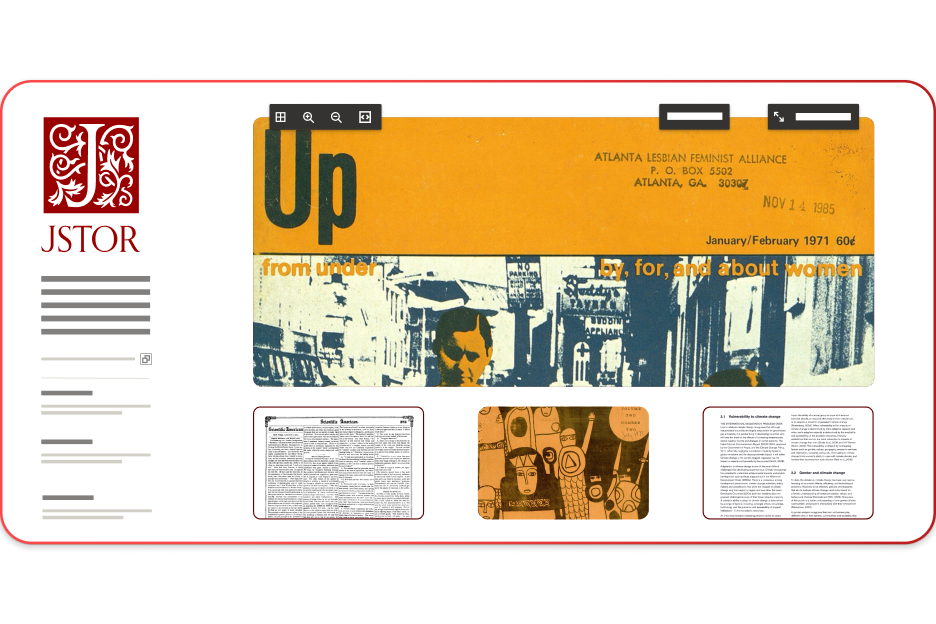
Increase visibility and impact
Share on JSTOR or more broadly on Omeka, other platforms, or your library catalog via OAI-PMH.
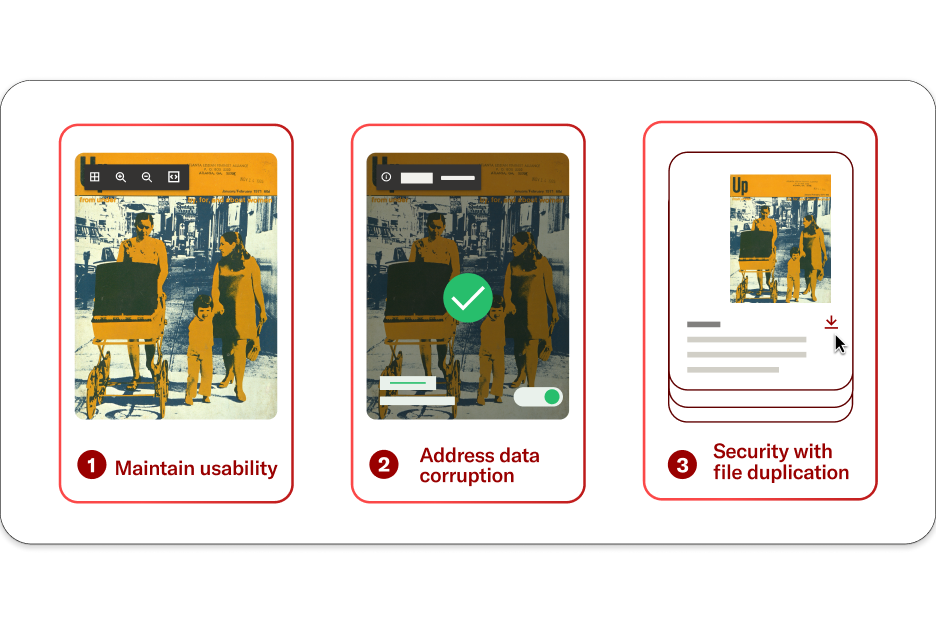
OAIS compliant digital preservation
Safeguard your valuable assets against data loss, obsolescence, and technological advancements. Powered by Portico.
Select the tier of functionality that best meets your needs
Share on JSTOR
- Provide access to users at your institution, or openly with researchers around the world
- Increase visibility through indexing in major search engines such as Google
- Enhance discoverability in common library discovery services, including EBSCO Discovery Service™ (EDS), OCLC WorldCat, and ProQuest/Ex Libris Primo/Alma
- Increase usage and reach of your digital assets alongside primary and secondary sources on JSTOR
- Strengthen your institution’s visibility with a dedicated, branded collections page
- Increase discovery and access to audio and video content with auto-generated transcripts and streaming capabilities
- Start with 5TB of content management allowance
- Measure impact with a self-service usage analytics dashboard
Preserve, manage, and share
- Optimize comprehensive digital asset management capabilities with long-term preservation and powerful sharing options
- Organize records and collections with intuitive, user-friendly tools
- Create structured metadata using standard or custom metadata schemas and linked authorities
- Efficiently catalog using metadata templates, bulk editing, and customizable workflows
- Share broadly beyond JSTOR: Exhibit on Omeka, and share on other platforms including DPLA and your library catalog via OAI-PMH
- Preserve valuable assets with OAIS compliant digital preservation, safeguarding against obsolescence and loss, powered by Portico
AI-assisted stewardship with JSTOR Seeklight
- Use the AI-powered tools of JSTOR Seeklight to rapidly generate descriptive metadata and project-level intelligence at scale
- Accelerate early-stage processing while maintaining expert oversight and control
- Streamline review and editing with built-in tagging and confidence scores, and ensure responsible AI integration through transparent workflows that enhance, rather than replace, professional expertise
- Process multiple formats, including images, handwritten documents, and text-based materials
- Transform large volumes of uploaded materials into access- and preservation-ready resources
- Organize files from box, folder, and file structures into cohesive groupings, generating structured summaries to support finding aids
- Ensure standards-compliant metadata for seamless interoperability across archival and library systems
- Option to join the charter program and help shape the future of AI-assisted digital stewardship
Looking for more flexibility? Add-on services are available for one-time content migration, ongoing collection harvesting, and additional content management or preservation allowances. Contact us to learn more.
Help shape the future of AI-assisted digital stewardship
Perspectives from the field
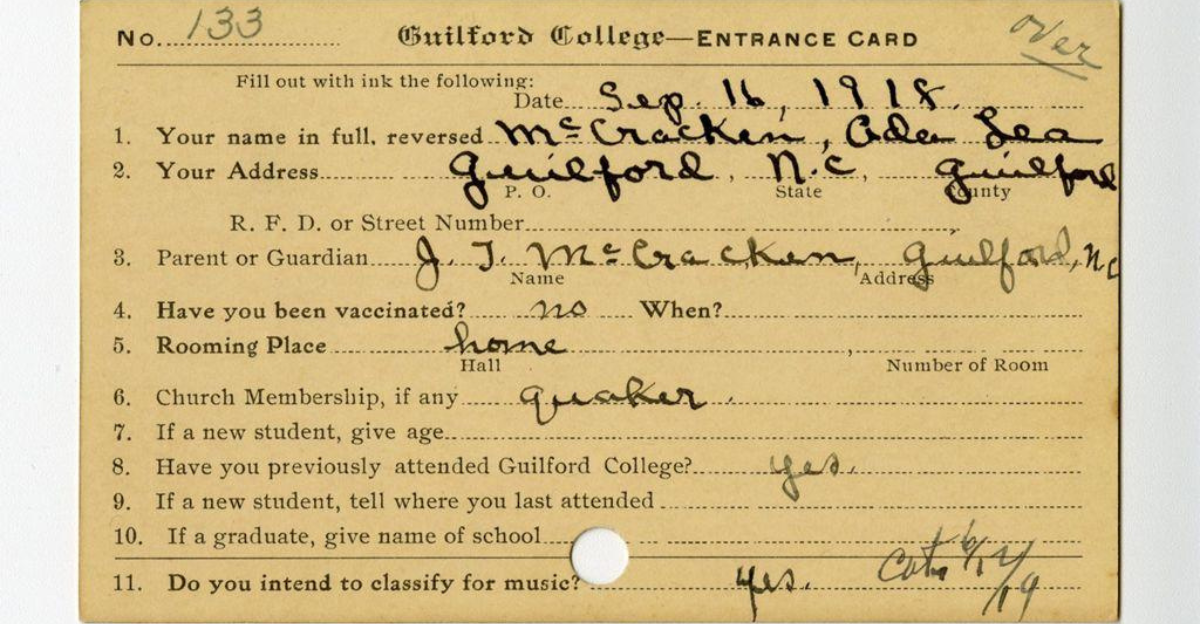
Small team, big reach
Guilford College uses JSTOR Digital Stewardship Services to scale digital collections, empower students, and share Quaker history.
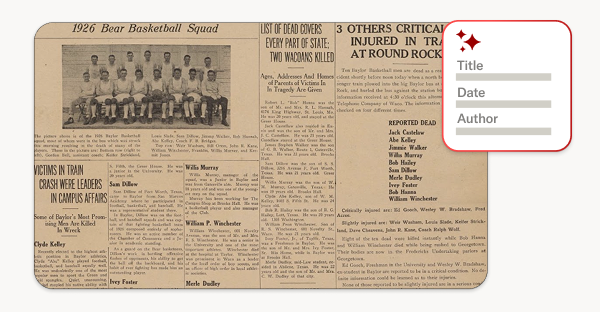
Designed by the community, for the community
Discover how archivists and librarians shaped JSTOR’s AI-assisted tool that streamlines metadata creation, tackles backlogs, and enhances digital stewardship.
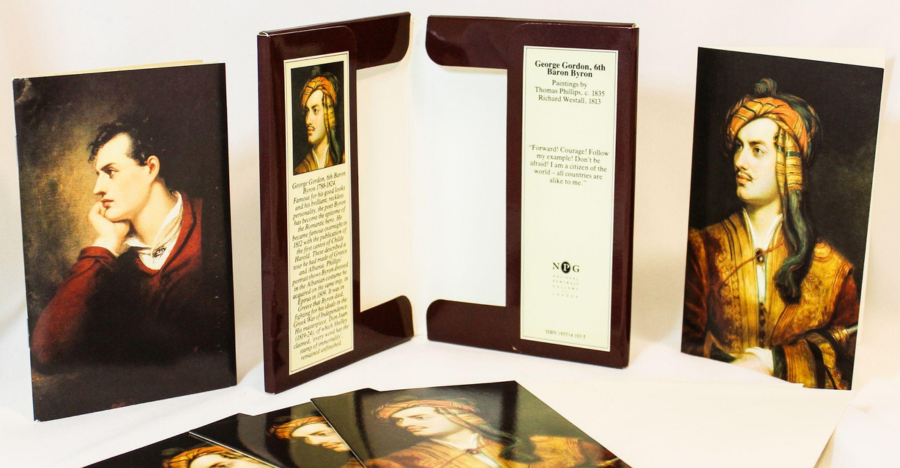
Drew University illuminates valuable scholarship and engages students in collection stewardship
Learn how Drew University’s manager of Special Collections, Candace Reilly, uses JSTOR Digital Stewardship Services to expand access to scholarship and increase student engagement.
Frequently asked questions
- What are the differences between the JSTOR Digital Stewardship Services offerings?
JSTOR Digital Stewardship Services is offered in three tiers to meet the diverse needs of institutions:
- Tier 1: Share collections on JSTOR, making them discoverable alongside scholarly research. Includes audio/video hosting, usage analytics, and indexing in search engines and library discovery services.
- Tier 2: Everything in Tier 1 plus digital asset management with flexible cataloging tools, broader sharing options, and OAIS-compliant preservation.
- Tier 3: Everything in Tiers 1 and 2 plus the AI-powered tools of JSTOR Seeklight for rapidly generating descriptive metadata at scale, and the ability to accelerate early-stage processing while maintaining expert oversight and control.
- What are the fees to participate?
As a nonprofit, JSTOR operates on a cost-recovery model to sustain and expand our services while keeping them accessible to a broad range of institutions. Pricing varies based on institution type and selected services:
- Tier 1 and Tier 2: To find the most relevant pricing details for your organization, please visit our fees and classifications page.
- Tier 3: Institutions can participate in our charter program, which provides a unique opportunity to help shape AI-assisted digital stewardship while benefiting from:
- Charter member savings.
- Expanded processing capabilities.
- Direct collaboration with a mission-driven nonprofit.
Annual fees for charter program members begin at $6,000. Learn more about the charter program.
For additional questions or customized pricing guidance, reach out to participation@ithaka.org.
- Is JSTOR offering a charter program for Digital Stewardship Services?
Yes. In keeping with our community-driven, continuous learning approach to developing solutions, JSTOR views charter programs as an essential part of our process, providing a structured onramp for institutions that are early adopters of new resources.
Institutions opting into Tier 3 of JSTOR Digital Stewardship Services can participate in our charter program, which offers additional support, peer collaboration, and other incentives for those integrating AI-powered collection processing support into their workflows.
Charter participants receive expanded processing capabilities, exclusive savings, and the opportunity to collaborate with JSTOR and peer institutions to shape the evolution of these services.
Learn more about the charter program. - Do JSTOR’s services integrate with other systems?
Yes, our services are designed for seamless interoperability with a range of library technologies, ensuring broad discovery, preservation, and data portability. Key integrations include:
- Discovery and access: Collections shared on JSTOR are indexed in Google and other major search engines, as well as library discovery services, including EBSCO Discovery Service™ (EDS), OCLC WorldCat, and ProQuest/Ex Libris Primo/Alma.
- Metadata sharing and harvesting: Support for OAI-PMH enables integration with Omeka, DPLA, library catalogs, and beyond, ensuring metadata can be harvested for broader dissemination.
- Long-term preservation: Portico integration provides trusted long-term digital preservation, safeguarding collections against obsolescence.
Data portability: Flexible data export allows institutions to use their collections and metadata in other systems as needed.
- How does JSTOR ensure long-term preservation of digital assets?
JSTOR ensures robust, standards-compliant digital preservation through its integration with Portico, a leading digital preservation service. JSTOR and Portico are both nonprofit services of ITHAKA. Key features include:
- Portico-powered preservation: JSTOR leverages Portico’s proven infrastructure to provide secure, long-term digital preservation.
- Active monitoring: Scheduled scans detect format obsolescence and perform necessary format migrations to maintain usability.
- Fixity checks: Regular integrity checks detect and address data corruption.
- Geographically distributed storage: Multiple redundant copies ensure long-term protection.
- Compliance with preservation standards: Adherence to established digital preservation standards, including the Open Archival Information System (OAIS) and Preservation Metadata (PREMIS), ensure a trusted preservation environment.
Learn more about our preservation standards and process or explore guidance on best practices for using our services to preserve your content.
- How do JSTOR’s services improve discoverability?
Once your collections are shared to JSTOR, your institution benefits from the strengths of the JSTOR platform, including:
- Availability to millions of researchers worldwide.
- The ability to cross-search your collections alongside other scholarly materials on JSTOR.
- Indexing in Google and major search engines (JSTOR is one of the world’s top ranked websites on Google).
- Integration with library discovery services, ensuring seamless academic access.
Additionally, institutions can enable broad metadata sharing via OAI-PMH, allowing integration with Omeka, DPLA, and library catalogs, expanding discoverability beyond JSTOR’s platform.
- Are collaborative workflows supported?
Yes, our cloud-based solution provides real-time access from anywhere, enabling unlimited collaboration and improved accessibility. With multi-user support, role-based access, and real-time updates, it seamlessly scales across departments and projects to streamline workflows.
- What type of files are supported?
Our services support the management of a wide variety of digital assets, including images, documents, audio, and video. Learn more.
Please note: AI-assisted collection processing tools from JSTOR Seeklight (Tier 3) currently support text-based documents, handwritten materials (PDF), and images (JPG) only. We are exploring future expansions to support additional file types such as audio and video.
- What training and support are available?
We offer a range of education and support resources to help ensure your success:
- Personalized onboarding
- Included in Tier 3 (up to 3 hours) and Tier 2 (up to 2 hours)
- Tailored to your institution’s workflows and priorities
- Flexible format—can be split across multiple sessions
- Self-service resources
- Unlimited access to a dedicated support site with documentation and tutorials
- Tier-specific video tutorial playlists for Tier 1, Tier 2, and Tier 3
- Playlists are easy to embed in your institution’s local guides and documentation
- Ongoing training
- Regular live training webinars
- Recordings of open sessions are shared with registrants and posted on JSTOR’s YouTube channel, including captions and transcripts for accessibility
- Is migration support available for transitioning from another platform?
Yes. For institutions moving from a legacy system into JSTOR Digital Stewardship Services, a one-time, fee-based content migration service is available. This add-on service is designed to support a full transition, making it easier to consolidate digital collections into JSTOR Digital Stewardship Services as the primary content management platform. Contact participation@ithaka.org to learn more.
- Is there a service for regularly adding content to Digital Stewardship Services?
Yes. JSTOR Digital Stewardship Services offers harvesting as an add-on option for institutions that want to keep their collections up to date by regularly transferring content from another system into their JSTOR Stewardship environment.
Harvesting is ideal for institutions that manage collections across multiple platforms and need a reliable, hands-off way to bring new or updated content into JSTOR Stewardship on an ongoing basis. Learn more about what harvesting offers and how it works.
- How can my institution participate?
You can book a demo or contact participation@ithaka.org to learn more. We look forward to hearing from you!